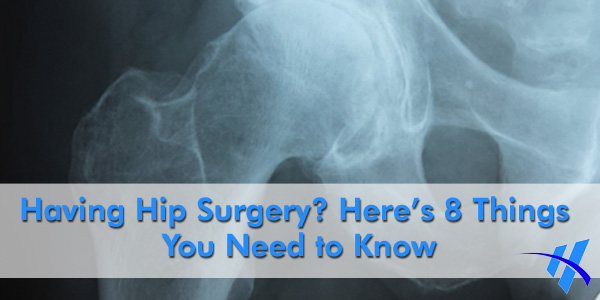Having Hip Surgery? Here’s 8 Things You Need to Know

Americans are hard on their hips, and the data definitely backs that statement up. With over 332,000 total hip replacements occurring in 2010 (the last year data from the CDC was available) and with that number expected to grow as the American population continues to age, knowing the best practices for pre- and post-hip replacement will be more beneficial.
This month, Homepro Medical Supplies is taking a two-pronged approach to making this information well known. In our two-part blog series in this month, we’ll examine the pre- and post-op considerations for those facing hip replacement, as well as the specific equipment and accessories that help make recovery from hip surgery smoother and less painful.
Let’s take a look at what you need to know if you have recently scheduled or will be scheduling a hip replacement surgery.
Before Your Hip Surgery
While scheduling your surgery is definitely the most important thing when needing a hip replacement, there are a few smaller but equally important tasks you need to take care of:
- Be sure you schedule and attend any additional appointments with your doctor for drawing blood or other pre-surgery tests.
- You will also want to start preparing your home for when you come back after your surgery. This includes moving or removing furniture to increase the width of walkways and paths throughout your home to prevent bumping or tripping, both of which are painful for hips that have been recently operated on.
- Get your support team assembled if you need one. Make sure you have someone who can pick you up from the hospital after your surgery, as well as someone to be with you during various parts of the day if needed.
- You should also consider, with approval from your doctor, doing pre-surgery hip exercises to help strengthen your hip and improve flexibility.
After Your Hip Surgery
The average recovery time for hip replacement surgery is about six months, so it’s important to understand the precautions and concerns you will be facing before you have the surgery done.
Pain, the incision site, your temperature and swelling are four of the main things you will need to keep under observation
- Pain is normal after any surgical procedure, and commonly increases as you become more active in your rehab. Severe, sharp pain that is constant may signal a complication, so don’t hesitate to call your doctor’s office if this occurs.
- The incision site needs to be kept as dry as possible until after the staples are removed. Any unusual redness, swelling or draining from the wound is cause to contact your doctor’s office.
- A slightly elevated temperature is nothing unusual in the first few days after surgery. However, if the fever persists over 101 degrees Fahrenheit and is accompanied by chills, sweats or increased pain or drainage at the incision site, you need to get in touch with your doctor.
- Normal swelling in the operative leg is reduced in the morning, but gradually increases throughout the day. You should contact your doctor if swelling is high in the morning upon waking, or if swelling is accompanied by higher than usual pain.
There are also additional concerns post-op that you need to be aware of. Bending your hip joint past a 90 degree is a definite “no,” as that will only put stress on your freshly replaced joint. Continued stress can result in severe pain and your body not repairing itself as it should. Squeezing your legs together and bringing your knee toward your chest are also not recommended. A few other concerns you should be prepared for include:
- Bumping- hitting a table corner, night stand or wall with your operative hip is extremely painful. This is why preparing your home for after your surgery is important.
- High doses of medication- you will be taking various medications for your pain and blood clots, so vision, decision making and balance may be compromised. Having a family member or friend around to help you move about your home is helpful.
- Unsteady gait- even if your medications aren’t affecting you, the trauma of the surgery on your muscles and gait will. Be cautious when it comes to moving around your home, and don’t be afraid to ask for help.
By taking both pre-op and post-op concerns into consideration, you can make your hip replacement surgery go smoother and get back to a normal, pain-free life easier.
In our next blog later this month, we’ll take a look at the medical equipment and accessories, all available from Homepro Medical Supplies, that will make your recovery as efficient and painless as possible.



 (800) 437-3677
(800) 437-3677